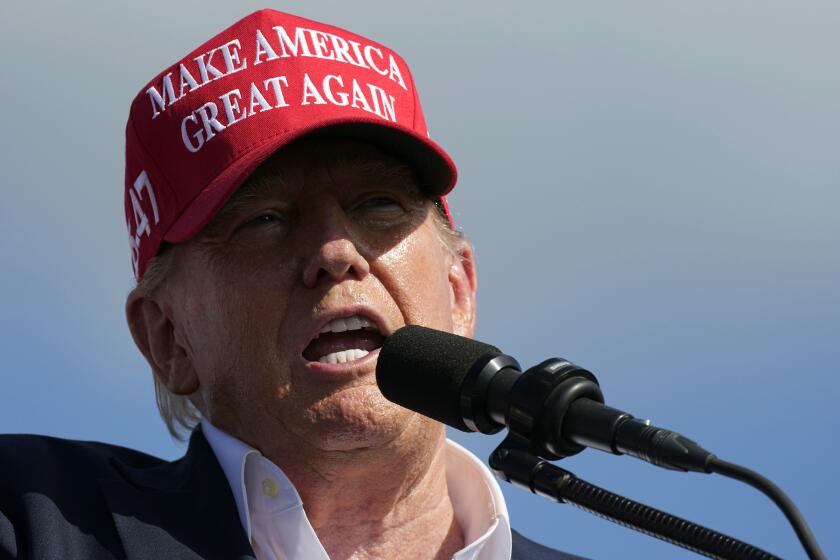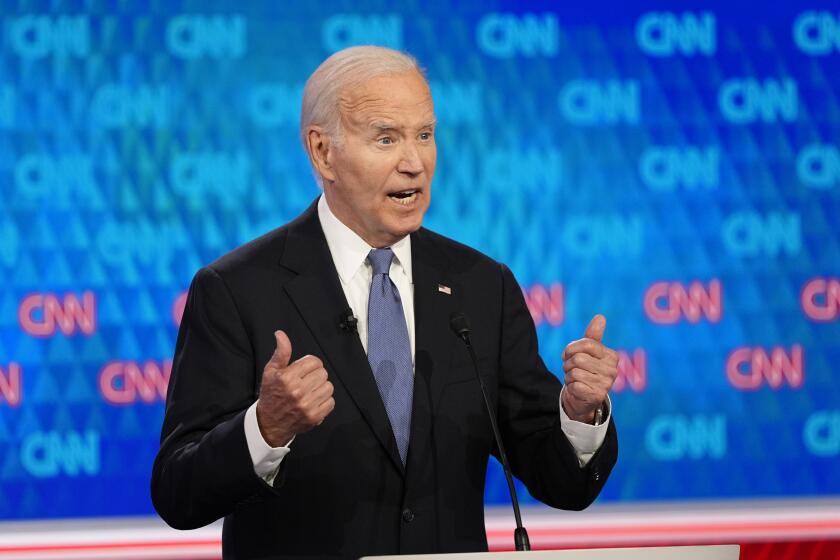Obama summons budget negotiators as talks stall
Closed-door federal budget negotiations hit a standstill just days before government funding expires, and President Obama summoned congressional leaders to the White House for a meeting Tuesday that could provide the setting for a deal.
Negotiators tripped on several difficult issues as they tried to craft the details of an agreement that would cut $33 billion from domestic spending over the remaining six months of the 2011 fiscal year.
Federal workers began preparing for a disruption in government services, including a possible delay in income tax refunds, that would occur if a compromise is not struck by Friday’s deadline. And GOP aides were preparing another temporary funding measure that might avert a shutdown, but Democrats were likely to consider its cuts draconian.
The latest stopgap measure from House GOP leaders would last a week and would cut $12 billion from domestic programs — far beyond the rate of $2 billion a week in previous temporary bills. Although it would to appeal to “tea party” conservatives, it is unlikely to find support in the Democratic Senate.
Democrats are also unlikely to support another stopgap bill unless time is needed after Friday to conduct floor votes once a longer-term agreement is reached.
Both Republicans and Democrats risk voter backlash if they cannot agree on the 2011 spending plan. A new Pew Research Center poll showed voters would blame Republicans and the Obama administration almost equally if the federal government is shut down. But both also face the anger of their supporters, with conservatives clamoring for deeper cuts and liberals demanding that social services and programs for the poor be spared.
House Republicans have grown eager to turn the page on the 2011 budget debate. GOP leaders on Tuesday will unveil their 2012 budget, an ambitious blueprint that aims to fulfill their campaign pledge to dramatically cut the size and scope of federal operations, going beyond the 12% slice of the budget now being debated.
Still, House Speaker John A. Boehner (R-Ohio) remains under pressure from tea party conservatives not to yield to Democrats. He insisted Monday that no agreement on the $33-billion package had been reached.
“I’ve made clear that their $33 billion is not enough, and many of the cuts that the White House and Senate Democrats are talking about are full of smoke and mirrors,” Boehner said Monday. “That’s unacceptable.”
A major disagreement has to do with the types of programs to be cut. Republicans have insisted that the savings come by shrinking discretionary domestic programs. Substantially cutting or eliminating such programs would make it politically difficult to reinstate them in future years.
Democrats, though, have introduced ways to save money by reducing accounts in mandatory programs, such as agriculture supports and transportation projects. Some programs have unspent funds that could be used as one-time or ongoing savings.
The GOP had included such reductions in an earlier House-passed bill, but Democrats want to expand their use so that up to half of the $33 billion comes from those savings, an approach denounced by Republicans.
Boehner faces the task of crafting a deal that could pass the House even if a sizable number in his Republican caucus rejects it, as is considered increasingly possible.
“I think all of us feel very strongly about the message that was sent Nov. 2: The American people expect us to be strong,” said. Rep. Mike Kelly (R-Pa.), a freshman who said he would not vote for the $33-billion compromise, even if it risked his reelection. “We came for a cause, not a career.”
Many conservatives want to see inclusion of nearly 70 policy proposals, such as measures to defund Planned Parenthood and gut the Environmental Protection Agency, which Senate Majority Leader Harry Reid (D-Nev.) has said would not be accepted by Democrats.
“We are confident that in the end Republicans will reject cries from the tea party to shut down the government and work with us on a solution,” said Reid spokesman Jon Summers.
Because some Republicans have insisted they would not agree to another temporary bill without ensuring the Pentagon is no longer subjected to continued threats of budget disruptions, the GOP’s latest stopgap measure would also fund the Defense Department through the end of the fiscal year.
Boehner also told rank-and-file lawmakers that they would be given information Tuesday about how the House would function during a shutdown.
William R. Dougan, president of the National Federation of Federal Employees, which represents 110,000 workers across the country, said the ripple effect of employees being out of work would particularly hurt small communities that rely on government employers. About 85% of the federal workforce lives outside the Washington area, he said.
kathleen.hennessey@latimes.com
Christi Parsons in the Washington bureau contributed to this report.
More to Read
Get the L.A. Times Politics newsletter
Deeply reported insights into legislation, politics and policy from Sacramento, Washington and beyond. In your inbox three times per week.
You may occasionally receive promotional content from the Los Angeles Times.








